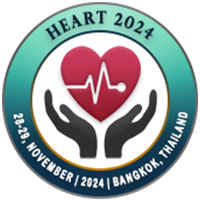
Hanane Zouzou
University Batna, AlgeriaTitle: The effectiveness of Anti tachycardia pacing in selected patients with implantable cardioverter defibrillator.
Abstract
Background: Implantable Cardioverter Defibrillators remain
cornerstone of therapy for patients at high risk for sudden cardiac death.
High-energy shocks delivered have a number of adverse consequences.
Anti-tachycardia pacing often neglected in the past because of concerns about
its efficacy, especially in fast ventricular tachycardia, the risk of
arrhythmia acceleration and the possibly of syncope due to delayed definitive
shock therapy. Its efficiency depends essentially on the mechanism of
ventricular arrhythmia; it could be more efficient in reentrant ventricular
tachycardia; this mechanism is often encountered in arrhythmogenic right
ventricular dysplasia / cardiomyopathy and ischemic cardiomyopathy.
Cases report: We report the efficiency of anti-tachycardia pacing as
first and unique therapy for nineteen patients: Six patients with
arrhythmogenic right ventricular dysplasia / cardiomyopathy, nine with ischemic
cardiomyopathy, and four with dilated cardiomyopathy. Before implantation,
sixteen patients had experienced syncope and/or hemodynamic instability and
three patients had experienced cardiac arrest. All those patients were received
Implantable cardioverter defibrillators: fifteen dual chambers and four with
resynchronization therapy.
Results:
Anti-tachycardia pacing was efficient for all those patients, they didn’t feel
discomfort. In one of our patients one episode of ventricular tachycardia was
accelerated into fast ventricular tachycardia by 9 bursts therapies but rapidly
reverted by ramp therapy. Anti-tachycardia pacing programming was tailored
depends on the mechanism of arrhythmias and also on the rate of spontaneous VT. During follow up,
the low recurrence of ventricular tachycardia has become obvious for the
majority of patients, and marked improvement of left ventricular systolic function
in patients with ischemic cardiomyopathy.
Conclusion: Tailored Anti-tachycardia pacing programming could be
more effective and safe in patients with implantable cardioverter
defibrillator; it may contribute to the improvement of left ventricular
function and the reduction of ventricular tachycardia recurrence.
Biography
Class "A" Lecturer in Cardiology, Department of Medicine, Algeria

